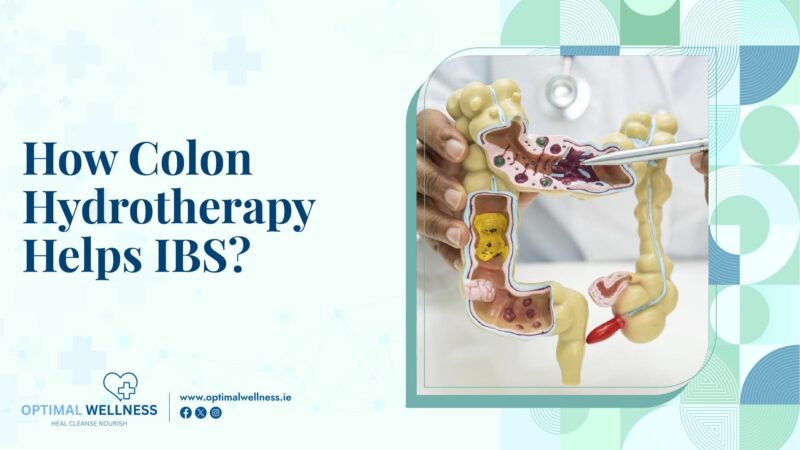While there’s no definitive cure for IBS, many people seek alternative treatments like colon hydrotherapy to relieve their symptoms. Here’s how colon hydrotherapy helps IBS.
How Colon Hydrotherapy Helps IBS?
Relieving Constipation
- For IBS sufferers who experience constipation, colon hydrotherapy can help soften and eliminate hardened stool that may be causing discomfort. By clearing out waste material, some patients report feeling less bloated and more comfortable after a session.
Reducing Bloating and Gas
- Excess gas and bloating are common complaints for IBS patients. Colon hydrotherapy may temporarily reduce bloating by helping to clear trapped gas and remove waste that may be fermenting in the colon. This can lead to a flatter stomach and a feeling of lightness post-session.
Promoting Regularity
- Some people with IBS experience irregular bowel movements, swinging between constipation and diarrhoea. Colon hydrotherapy may help balance bowel movements by promoting the removal of waste in a more efficient manner. However, this is often a temporary solution and long-term management should focus on lifestyle and diet.
Potential Stress Relief
- Stress and anxiety often exacerbate IBS symptoms. The relaxing nature of the hydrotherapy session and the relief of digestive discomfort may help reduce stress, indirectly benefiting IBS symptoms. However, hydrotherapy should not replace mental health care if stress is a significant trigger for IBS.
Considerations and Caution

While colon hydrotherapy may offer relief to some IBS sufferers, it’s important to approach it with caution. IBS can be highly individual, and what works for one person may not work for another.
- Hydration: Colon hydrotherapy removes water from the body, so staying hydrated before and after the procedure is crucial to avoid dehydration.
- Gut Flora Disruption: The procedure may flush out beneficial bacteria along with waste, which can potentially disrupt the balance of your gut microbiome. This can sometimes exacerbate IBS symptoms, particularly diarrhoea.
- Consult a Healthcare Provider: Always consult your healthcare provider or gastroenterologist before trying colon hydrotherapy, especially if you have IBS. Some individuals may experience worsened symptoms or other complications.
Dietary Practices to Alleviate IBS Symptoms

While colon hydrotherapy may provide temporary relief, managing IBS in the long term requires focusing on dietary and lifestyle changes. Here are some effective dietary strategies for alleviating IBS symptoms:
Low-FODMAP Diet
Many people with IBS find relief by following a low-FODMAP diet, which involves reducing foods that are high in fermentable sugars. Foods like onions, garlic, beans, and certain fruits (such as apples and pears) are common IBS triggers. A low-FODMAP diet can help minimize bloating, gas, and diarrhoea.
Increased Fibre Intake
For those with constipation-dominant IBS, increasing soluble fibre intake can help. Foods like oats, carrots, and psyllium husk can aid digestion and regulate bowel movements. However, insoluble fibre (like in whole grains and bran) can worsen bloating, so it’s essential to monitor fibre sources.
Stay Hydrated
Proper hydration is key to maintaining smooth digestion. Drinking plenty of water throughout the day helps soften stool and promotes regular bowel movements, which is particularly helpful for IBS patients.
Incorporate Probiotics
Since IBS is often associated with an imbalanced gut microbiome, consuming probiotics through fermented foods (like yogurt, sauerkraut, and kefir) or supplements can help restore healthy gut bacteria, potentially easing symptoms.
Avoid Trigger Foods
Common trigger foods for IBS include caffeine, spicy foods, alcohol, and fatty or fried foods. Keeping a food diary can help you identify which foods exacerbate your symptoms so that you can avoid them in the future.
How colon hydrotherapy helps IBS

While colon hydrotherapy may provide temporary relief for certain IBS symptoms, such as bloating and constipation, it should be approached cautiously and only under medical guidance. The best long-term strategy for managing IBS often lies in dietary and lifestyle modifications, such as following a low-FODMAP diet, staying hydrated, and incorporating probiotics.
If you’re considering colon hydrotherapy for IBS, be sure to consult with your healthcare provider to ensure it’s a safe and appropriate option for your specific condition. By combining safe practices with a balanced diet, you can manage IBS symptoms and improve your overall digestive health.
Feel relief in your wellness journey with Optimal Wellness approach of colon hydrotherapy for IBS.

